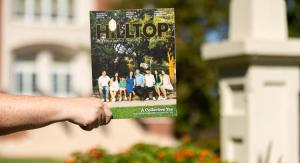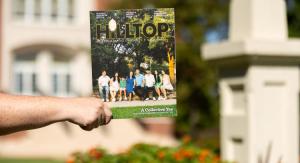April 16, 2016
MARSHALL NEWS MESSENGER: MARSHALL, Texas (4/14/16) - East Texas Baptist University would not be required to offer controversial contraceptive coverage in its self-insured employee insurance plan, according to a March 29 proposal from the U.S. Supreme Court.
The Becket Fund for Religious Liberty, which represents the university, responded to the court's proposal on Tuesday with a resounding "yes."
"These non-profits said 'yes' to the supreme court, just as they have been saying 'yes' to the federal government for many years," the fund's Senior Counsel Mark Rienzi said. "At some point, the government has to learn how to take yes for an answer. The religious objection has always been only to those methods of distribution that forced the non-profits and their plans to participate."
The Marshall university appealed to the land's highest court in February after a lower court's decision required the university to offer the contraceptive coverage according to the HHS Mandate or face federal fines.
The university argued that offering the insurance coverage that includes drugs such as "the morning after pill" and Plan B, which prevents or stops early pregnancy, violates their religious liberty.
The university is joined in the appeal by two other private religious institutions, Houston Baptist University and Pennsylvania-based Westminster Theological Seminary.
Under the U.S. Supreme Court's solution proposal, the university would not offer the four drugs that they claim violate their religious freedoms.
Instead, under the proposal, the employee would find an alternative insurance provider that offered the contraceptives, at the federal government's cost.
The fund's Deputy General Counsel Eric Rassbach said Wednesday that the unprecedented move by the U.S. Supreme Court to ask for additional briefs from the involved parties in regards to the court's proposal shows the justices are trying to find a solution for all involved parties.
"Not since Brown versus the Board of Education has the U.S. Supreme Court asked for supplemental briefs after oral arguments," Rassbach said. "This means they are really trying to figure out a way to make this work under the statutes of the HHS Mandate and to provide access to contraceptives for all without infringing on the religious beliefs of these institutions."
Rassbach said while the federal government wasn't in complete agreement with the high court's proposal, they did submit a brief on Tuesday mostly in acceptance.
"Both we and the federal government filed Tuesday to say 'yes.' The government didn't like it but they agreed, in theory, they might be able to make it work," Rassbach said. "The university does offer in its insurance coverage, preventative contraceptives. It is only the four abortifacients they object to. Under the court's proposal, the employee can opt in to a plan offered by a separate insurance at the cost of the government."
Rassbach said the religious institutions have been willing to follow this proposal all along.
"We have been saying this for a long time," Rassbach said. "We don't have an objection to the government having separate arrangements with employees, just leave us out of it."
Now the final decision rests in the hands of the eight U.S. Supreme Court justices, Rassbach said.
"A week from today we will file the last set of briefs where we each respond to the other side's brief. The court's term ends at the end of June and we could have a decision then or they could vote in a tie and postpone it a year."
"This case is about the freedom of all Americans to follow their faith," ETBU President Blair Blackburn said Tuesday. "We simply ask the court to recognize that ETBU is a conscientious objector, and that the federal government is insisting that we act as a conscientious collaborator.
"We are hopeful that the supreme court will recognize the substantial burden to ETBU's free exercise of religion, and then apply the least restrictive means to further any compelling governmental interest."
(Used by permission www.marshallnewsmessenger.com. Story by MNM reporter Bridget Ortigo)
RELEASE from the Becket Fund:
Religious non-profits tell Court: Yes there is a solution
WASHINGTON, D.C. (4/12/16) – Less than a week after the Supreme Court heard the case of the Little Sisters of the Poor (Zubik v. Burwell), the Court made an unprecedented move asking both sides to provide additional arguments about whether the government could find ways to distribute contraceptives without the involvement of religious non-profits and their health plans. The Court had also asked whether, for non-profits who buy traditional insurance plans, the government might hire the same insurance company to provide the drugs.
The religious non-profits told the Supreme Court: “The answer to that question is clear and simple: Yes.”
“These non-profits said “yes” to the Supreme Court, just as they have been saying “yes” to the federal government for many years.” said Mark Rienzi, senior counsel at the Becket Fund for Religious Liberty, which represents the Little Sisters of the Poor. “At some point, the government has to learn how to take yes for an answer. The religious objection has always been only to those methods of distribution that forced the non-profits and their plans to participate. The government should move on from this unnecessary fight, and go provide these services some other way that doesn’t use nuns.”
The government exempts 1 in 3 Americans from this regulation. It also exempts large corporations such as Exxon and Pepsi Bottling. A total of 100 million Americans are exempted, yet the Little Sisters of the Poor face millions in fines unless they violate their faith.
“We were encouraged by oral arguments and the Court’s request for supplemental briefs,” said?Sister Loraine Marie Maguire, Mother Provincial for the Little Sisters of the Poor. “We have always believed a solution is possible, and are hopeful the government will let us serve.”
The Little Sisters of the Poor are a 175-year-old order of religious women who care for the elderly poor. More information can be found about the case here: www.thelittlesistersofthepoor.com.
Religious college plaintiffs also weighed in. “This case is about the freedom of all Americans to follow their faith,” said Dr. Blair Blackburn, President of East Texas Baptist University. “At ETBU, we are proud to be part of the long tradition of Baptists in America, just as Roger Williams advocated for religious freedom and separation of church and state in Colonial America and founded Rhode Island and the First Baptist Church in America. We simply ask the Court to recognize that ETBU is a conscientious objector, and that the federal government is insisting that we act as a conscientious collaborator.”
“At HBU, our faith animates everything we do, including our emphasis on academic excellence,” said Dr. Robert Sloan, President of Houston Baptist University. “We are hopeful that the Supreme Court will let us continue to serve our students and others.”

















